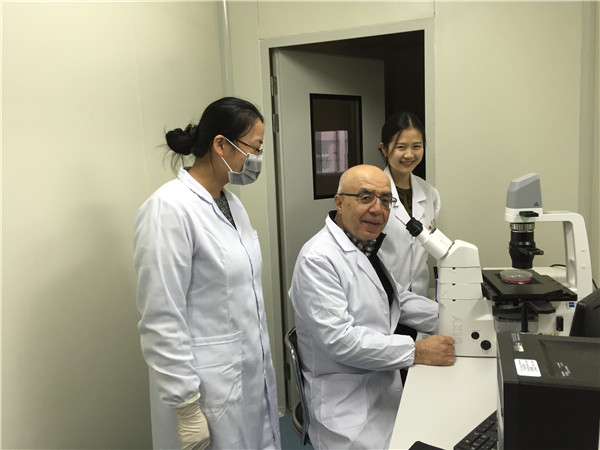On a herbal route
 |
|
Training local talent is one of Ben-David's biggest tasks here. [Photo provided to China Daily] |
The Sunnybrook Research Institute in Canada, where he worked earlier, has successfully identified oncogenes and tumor suppressor genes that have mutated in various forms of cancers.
In recent years, Ben-David turned his attention to studying the development of compounds and drugs that can be used to fight cancer.
He saw opportunities for breakthrough research in Guizhou when he first visited the laboratory in provincial capital Guiyang for lectures in 2013.
"I saw how I could make a difference here," says Ben-David of his decision to work in Guiyang.
"I am a biologist and they have chemists. They extract compounds from TCM and there has to be somebody to understand their functions. That is my expertise."
The province has suitable soil and air for the growth of herbs for TCM. The region is home to many ethnic groups, such as the Miao people who have used TCM for long.
Since 2013, Guizhou has invested about 200 million yuan ($29.4 million) annually to support the TCM industry.
Foreign professionals like Ben-David are also being sought by the province as it looks to drive research and innovation.
Few studies have been done on natural compounds extracted from TCM while many compounds used in Western medicine have already been analyzed.
"Here I have access to everything new and locally sourced," he says, adding that Chinese scientist Tu Youyou, who won last year's Nobel Prize in medicine for her research on an antimalarial substance, is an inspiration for him.
Although ancient, TCM is still not widely accepted globally because not many studies have been done on it.
He hopes to change the situation with his work, he says.
"Chemists can modify and develop TCM to make it better if we know how it works."
In2014, the Guizhou laboratory's program was included in the One Thousand Foreign Experts project, which was initiated by the central government in 2011 to invite foreign specialists to the country over a decade or so. The project provides grants to qualified candidates.
In this case, the laboratory has been given more than 10 million yuan to facilitate drug research by both the central and provincial governments.
Despite such support, Ben-David has had to deal with challenges, including building the laboratory from scratch and language barriers at the beginning, he says.
It's difficult to find enough local talent, because people usually prefer working in bigger cities like Beijing and Shanghai.
He has lost more than 10 trained technicians in the past two years, he says.
But Ben-David is glad that he has built an international-level laboratory, which has seen visits by high-level officials, including the Minister of Science and Technology, Wang Gang, earlier this year.
Now, Ben-David's team has about 15 chemists, whose work includes isolating components in TCM.
- China issues first white paper on traditional Chinese medicine
- Beijing takes social media route to promote TCM to foreigners
- Traditional Chinese medicine practitioners offer free treatment to Cambodians
- China considers enhanced supervision of TCM
- Europe's first Traditional Chinese Medicine museum opens in San Marino
















